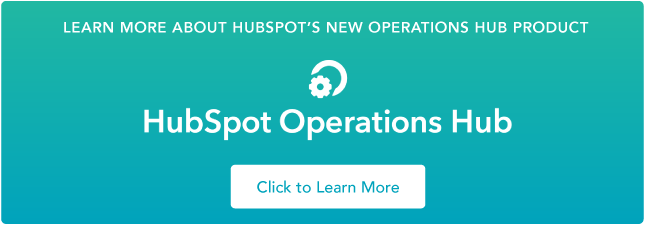Maintaining a contact database with high data integrity is essential for any organization. You need your data to be reliable, accurate, and complete, otherwise, you risk frustrating your customers with the wrong information, being unable to deliver personalized services, and losing faith in your reporting.
One of the biggest threats to data integrity is having duplicate contacts in your database.
In many cases, duplicate contacts are caused by human error. One team member might spell a contact’s name wrong, causing it to be added twice. It can also be caused by a contact filling in a form with a different email address or phone number.
In short: duplicate contacts can be a real pain. No business wants to have to deal with them, but the good news is that you don’t have to. Here’s what you need to know to get rid of duplicate contact data for good.
The Best Apps to Remove Duplicate Contacts
Some apps offer built-in deduplication features to locate and banish pesky duplicates by merging or deleting them.
For instance, HubSpot has a handy deduplication tool that uses AI to finds duplicate contacts and companies in the CRM. Google Contacts and iCloud also have useful built-in dedupe functions. It’s always a good idea to start with your apps’ functionality and clean up your data at the source.
However, many apps don’t have built-in dedupe functions, or they’re limited in quality. For most organizations, it’s valuable to choose a dedicated app for data quality and cleansing that works across multiple apps.
To avoid wasting time, money, and energy trying to fix duplicate contacts and their repercussions across your organization, here are five of the best apps to help you fix and avoid duplicates.
1. Dedupely
For: HubSpot, Salesforce, and Pipedrive
Dedupely helps remove duplicates from three of the most popular CRM platforms: HubSpot, Salesforce, and Pipedrive. It’s a really easy platform to navigate, and offers several filters to flag possible duplicates for first name, last name, email, company, and more. It also finds duplicates by exact, fuzzy, and similar matching to detect issues that other systems would miss.
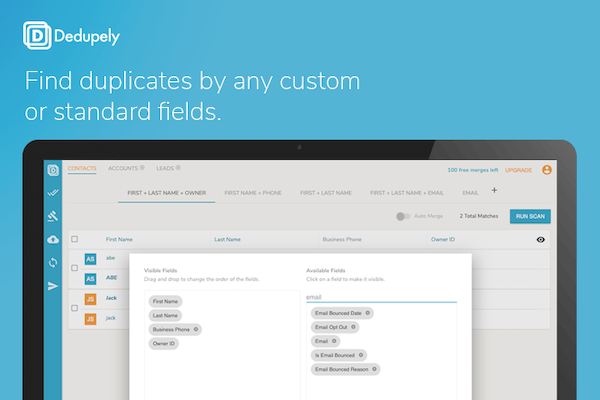
2. DemandTools from Validity
For: Microsoft Dynamics 365 and Salesforce
DemandTools is a CRM data quality suite that helps organizations optimize their data in Salesforce and Microsoft Dynamics 365 CRM.
It includes maintenance tools, cleaning tools, and discovery tools for comparing external data against the CRM and bulk email verification.
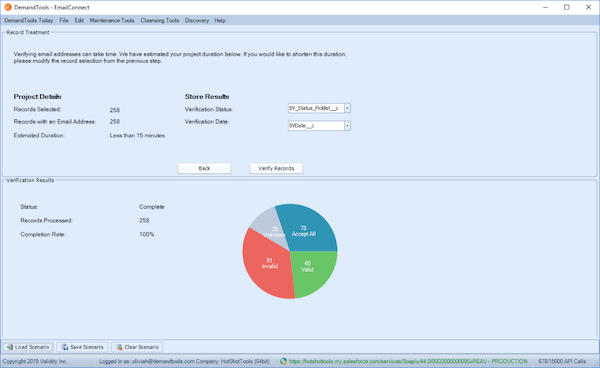
3. RingLead
For: Salesforce, Pardot, Eloqua, and Marketo
RingLead is a powerful data quality solution to cleanse data, stop dirty data at the source, enrich contact records with fresh information, and route leads to the right person at the right time.
It offers one-click integrations with Salesforce, Pardot, Eloqua, and Marketo.
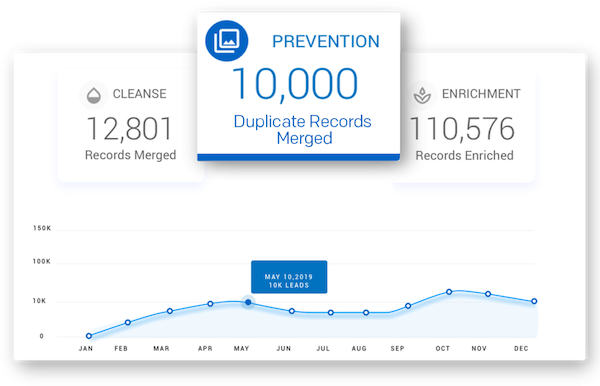
4. Openrise
For: selected marketing and sales automation apps, collaboration tools, data services and infrastructure platforms
Openrise’s data orchestration platform automates key processes including data cleansing and enrichment, deduplication, lead routing, and attribution to make your campaigns more successful.
It integrates with many popular marketing and sales automation apps plus collaboration tools like G Suite, data services including Cleabit, and infrastructure platforms such as MySQL.
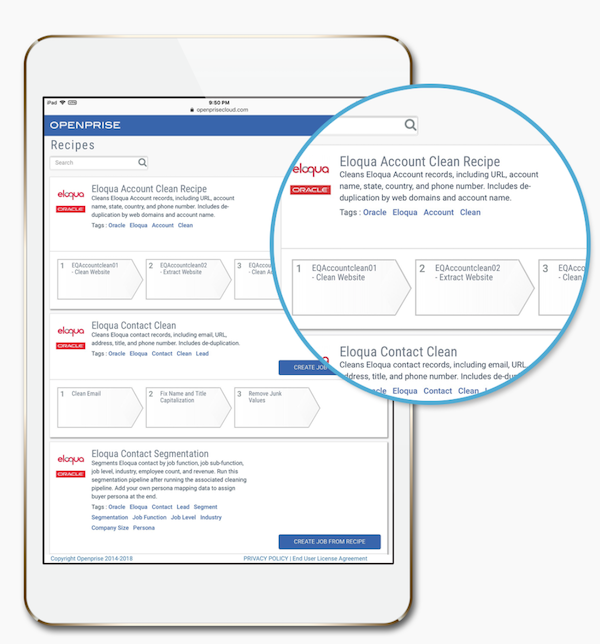
5. Contacts+
For: Google Contacts, iCloud, and Outlook
Struggling to manage different contacts in your Google, iCloud, and Outlook apps? Contacts+ is a helpful app that centralizes and syncs contacts between Google Contacts, iCloud, and Outlook so you always have the latest info on the app and device you’re using.
Not only is it a great way to sync your address books, but it also has sophisticated dedupe algorithms to pick up on duplicate contacts even when they’re not obvious to you or other apps.

Preventing Duplicates When Syncing Data
The tools we talked about here are amazing additions to your tech stack when it comes to managing your contact databases and keeping them organized. But another important step in contact management is syncing your contact data in two ways.
Operations Hub is a two-way contact data syncing tool that also has valuable advantages for preventing and merging duplicate contacts.
When you create a sync between your apps, say Google Contacts and HubSpot, you can choose which app has the authoritative data that should be chosen if there’s a conflict. This creates a “single source of truth” in your data: one of the benchmarks of a healthy database.
Operations Hub also defines contacts by their email address, which is a good way to avoid duplicates. And, for example, if in one app you have a contact called ‘Bill’ and another has a contact named ‘William’ — both of which are attached to the same email address — the tool will merge and enrich both contact records.
![]()


